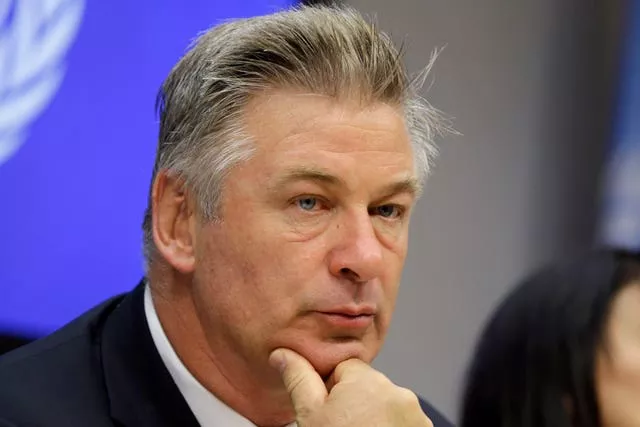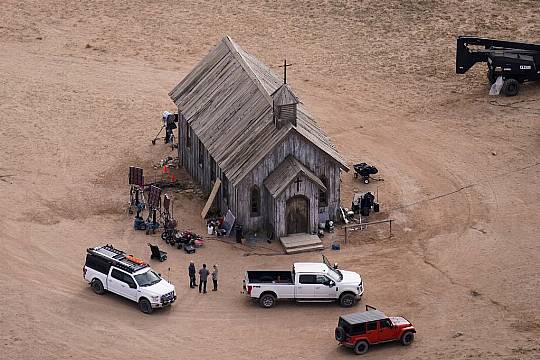A New Mexico judge is setting the table for the involuntary manslaughter trial of actor Alec Baldwin, who arrived at court on Monday, over the fatal shooting of a cinematographer on the set of the Western movie Rust.
Judge Mary Marlowe Sommer ruled that evidence about Baldwin’s secondary role as a co-producer of the film would not be allowed at trial, siding with defence lawyers.
Ms Marlowe Sommer said: “I’m having real difficulty with the state’s position that they want to show that as a producer, he didn’t follow guidelines and therefore as an actor, Mr Baldwin did all of these things wrong that resulted in the death of Ms Hutchins because as a producer he allowed these things to happen.

“I’m denying evidence of his status as a producer.”
Special prosecutor Erlinda Johnson argued unsuccessfully to allow evidence that Baldwin’s “role as a producer made him keenly aware of his responsibilities on set” for safety.
“It goes to Mr Baldwin’s knowledge, knowing that his conduct on set was negligent,” she said.
In the courtroom, Baldwin sat between lead attorneys Luke Nikas and Alex Spiro. He thumbed briefly through papers with a yellow legal pad in front of him, wearing glasses and close-cropped hair.
The trial starts on July 9 with jury selection and is scheduled to last 10 days.
Last week, the judge cleared the way for crucial firearms experts for the prosecution to testify about Baldwin’s handling of the revolver and whether the gun was functioning properly prior to the fatal shooting.
Prosecutors have argued that a state workplace safety investigation, which found serious violations on set, was incomplete, untrustworthy and should be prohibited from the trial.
Baldwin is charged with a single felony count of involuntary manslaughter punishable by up to 18 months in prison if he is convicted.

Hannah Gutierrez-Reed, the armourer on set, was convicted of involuntary manslaughter in cinematographer Halyna Hutchins’ death and sentenced to 18 months in prison. She is appealing the conviction.
In October 2021, Baldwin was rehearsing a cross-draw manoeuvre with the revolver when the gun went off, killing Hutchins and wounding director Joel Souza.
Baldwin has pleaded not guilty and claims the gun fired accidentally after he followed instructions to point it toward Hutchins, who was behind the camera.
Unaware the gun contained a live round, Baldwin said he pulled back the hammer — not the trigger — and it fired.
Baldwin’s lawyers also want to prevent discussion of actor Brandon Lee’s death from trial.
Mr Lee died from a fatal shot to the abdomen while filming a scene from The Crow in 1993. In that instance, a makeshift bullet was mistakenly left in a gun from a previous scene and struck Lee during filming for a scene that called for blank rounds.
Prosecutors have agreed not to illicit testimony about The Crow, but also contend that Baldwin knew about safety risks posed by guns — even when live rounds are not present.
Lawyers for Baldwin argue that it was inconceivable that live rounds would wind up on set.
Prosecutors want to exclude a letter signed by crew members that disputes the characterisations of the Rust set as chaotic or dangerous prior to the fatal shooting.

Prosecutors also want to exclude from trial the conclusions of the safety investigation into the fatal shooting that places much of the blame on assistant director Dave Halls.
Halls has pleaded no contest to negligent use of a firearm and may be called to testify at Baldwin’s trial.
Rust Movie Productions paid a 100,000 dollar fine (£77,995) to resolve violations of state safety regulations that were characterised as “serious” but not wilful, under a 2023 settlement agreement.
Prosecutors say conclusions of the investigation are easily contradicted by more reliable information.
Baldwin’s attorneys say the report cannot be ruled out as evidence and that state occupational safety officer Lorenzo Montoya should be allowed to testify at trial.
Another pre-trial motion might defuse snipping between the prosecution and defence teams. Prosecutors want the judge to preclude accusations of “prosecutorial misconduct” and “personal attacks”.
Prosecutors also want the judge to exclude evidence and arguments designed to garner sympathy for Baldwin, including indications of remorse or the impact of events on his family, arguing that it has no bearing on determining guilt.







